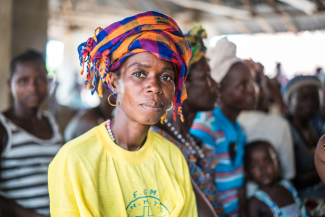In 2018, Sierra Leone conducted presidential and parliamentary elections resulting in a peaceful transfer of power from one political party to another, further consolidating the country’s commitment to democracy. To maintain that momentum and ensure that citizens remain confident in government and its ability to provide for the public good, USAID continues to support programs designed to strengthen accountability, good governance, and responsive public institutions, and promote societal cohesion by preventing political violence.
Local Governance
USAID fosters increased accountability of local-level decision-makers to citizens on issues of importance to the community, thereby strengthening the social contract. USAID local governance activities seek to increase the capacity of citizens and civil society to effectively advocate for their concerns and their opportunities to participate in local government processes, and to bolster the capacity of local decision-makers to gather input from citizens and stakeholders, to be more transparent in their processes, and to be more responsive to citizen needs.
USAID engagement during and following the 2018 elections demonstrated that issue-oriented media reporting, media dialogues, and political debates could help focus public and elite attention on development issues, rather than on the dynamics of ethno-political competition. USAID activities in Sierra Leone also work to increase the understanding that national and local media have of governance and political processes, their roles and responsibilities in a democracy, and in reporting on issues of importance to citizens.
Peacebuilding
Marginalization of women and young people, both in political and socio-economic terms, has been a long-term underlying factor in Sierra Leone’s fragility. USAID activities empower women and youth to lead conflict mitigation and prevention and peacebuilding within their communities. Peacebuilding activities incorporate people-to-people approaches to reduce violence triggered by political issues and processes, and to address underlying cleavages in communities.

USAID
